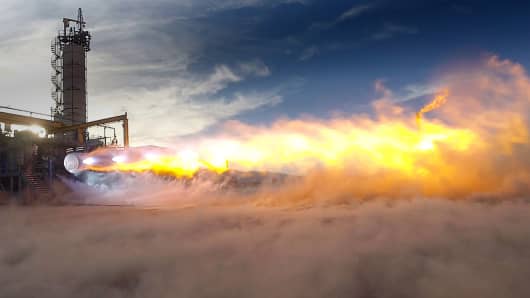20.04.2018
- Blue Origin's BE-4 engine has demonstrated that it "works, and works well," CEO Bob Smith tells CNBC.
- The rocket company founded by Jeff Bezos is quickly headed toward commercial operations.
- BE-4 will power the New Glenn orbital launch vehicle, which is being built to serve commercial, civil or military customers, Smith says.
Blue Origin is headed quickly toward commercial operations as the rocket company founded by Jeff Bezos nears the end of testing for several of its major projects.
The company's BE-4 engine, the thunderous staple of Blue Origin's propulsion business, has demonstrated that it "works, and works well," CEO Bob Smith told CNBC's Morgan Brennan at the 34th Space Symposium at Colorado Springs, Colorado.
Blue Origin recently test fired a BE-4 engine for nearly two minutes at nearly three-quarters of full power.
That test showed the durability of the engine, according to Smith, and how the design for reusability is paying off.
"That's why we've spent so much time in developing this, over seven years developing this engine, to make it reusable," Smith said. "This engine will actually perform 100 starts — 100 full missions that we'd actually be able to go do," Smith said.
BE-4 is built for Blue Origin's coming New Glenn rocket. Smith said the engine's predecessor, BE-3, "was designed with the same kind of principles." The BE-3 engine powers the New Shepard rocket, which launched, landed and successfully deployed an unmanned capsule in December. Smith said the smaller New Shepard rocket was launched five times without removing the BE-3 engine "or anything else on the rocket itself." BE-4 "is just a five times larger" engine, Smith said.
"We're excited about the commercial opportunities that's going to give us: when we fly it on New Glenn and when we hopefully get selected by United Launch Alliance for its vehicle, Vulcan, as well," Smith said.
The alliance — a joint venture between Boeing and Lockheed Martin — is in the final stages of negotiating which engine will power its next-generation rocket. Smith said. Blue Origin expects to find out the decision "very soon."
"We certainly are demonstrating all the technical characteristics that they need, for their vehicles," Smith said. "But we're going to offer it to whoever else will come out and say they need a new engine."
Landing rockets for reuse is a process Blue Origin and Elon Musk's SpaceX are pioneering. The latter is already applying the technology to commercial launches. Reusability provides tremendous cost savings of 50 to 75 percent, Smith said — a claim made more believable by SpaceX's massive Falcon Heavy rocket coming with a price tag of just $150 million, at most.
Progress on Blue Origin's New Glenn rocket is "going very well," Smith said. A major asset to New Glenn is its large faring — the nose cone that protects the payload during launch.
"We have a 7-meter fairing, which is the largest in the industry," Smith said.
Expected to launch in 2020, New Glenn is built to serve any customer — civil, commercial or military, Smith said.
He said Blue Origin also hopes to launch tourists to space before the end of the year on the New Shepard rocket. He cautioned that the company will only "go when we're ready."
"We want to make sure it's completely safe for our passengers," Smith said.
While rocket building and space tourism are exciting to Smith, Blue Origin, at its core, is "a propulsion company," he said. This is because Blue Origin follows "a lot of the same pathways" as Amazon when building business capabilities, Smith said.
"Amazon goes and builds capabilities, gains some customer base, then continues to build on that," Smith said.
Bezos' principles are apparent in Blue Origin, and Smith thinks it's about to pay off.
"That infrastructure is going to start having some returns in a relatively short period," Smith said. "We'll hopefully see some very big rewards here over the next six months to a year."
Quelle: CNBC

